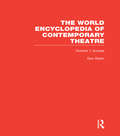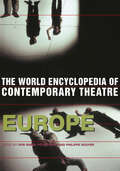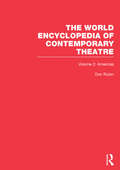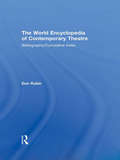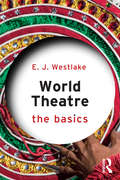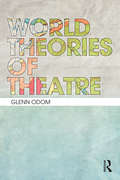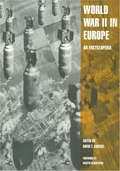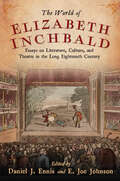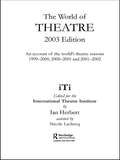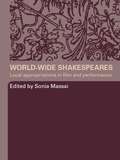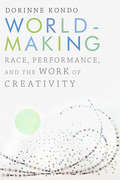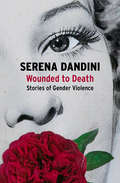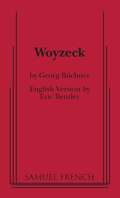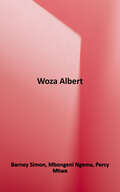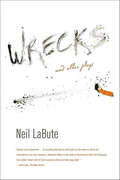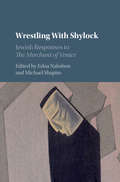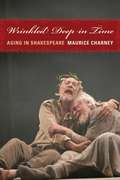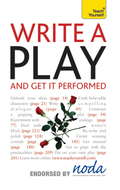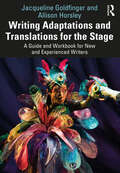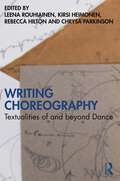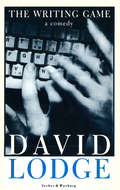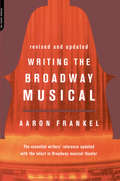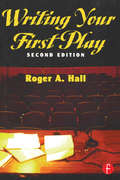- Table View
- List View
World Encyclopedia of Contemporary Theatre: Volume 1: Europe (World Encyclopedia Of Contemporary Theatre Ser. #Vol. 3)
by Don RubinThe World Encyclopedia of Contemporary Theatre:Europe covers theatre since World War II in forty-seven European nations, including the nations which re-emerged following the break-up of the former USSR, Czechoslovakia and Yugoslavia. Each national article is divided into twelve sections - History, Structure of the National Theatre Community, Artistic Profile, Music Theatre, Theatre for Young Audiences, Puppet Theatre, Design, Theatre, Space and Architecture, Training, Criticism, Scholarship and Publishing and Further Reading - allowing the reader to use the book as a source for both area and subject studies.
World Encyclopedia of Contemporary Theatre: Volume 1: Europe (World Encyclopedia Of Contemporary Theatre Ser.)
by Don Rubin Péter Nagy Philippe RouyerThis new paperback edition of the The World Encyclopedia of Contemporary Theatre: Europe covers theatre since World War II in forty-seven European nations, including the nations which re-emerged following the break-up of the former USSR, Czechoslovakia and Yugoslavia. Each national article is divided into twelve sections - History, Structure of the National Theatre Community, Artistic profile, Music Theatre, Theatre for Young Audiences, Puppet Theatre, Design, Theatre, Space and Architecture, Training, Criticism, Scholarship and Publishing and Further Reading - allowing the reader to use the book as a source for both area and subject studies.A new preface and further reading sections by the Series Editor brings the Encyclopedia bang up-to-date making it invaluable to anyone interested in European theatre, as well as students and scholars of performance studies, history, anthropology and cultural studies.
World Encyclopedia of Contemporary Theatre: Volume 2: The Americas (World Encyclopedia Of Contemporary Theatre Ser.)
by Don Rubin Carlos SolThe second volume of the World Encyclopedia of Contemporary Theatre covers the Americas, from Canada to Argentina, including the United States. Entries on twenty-six countries are preceded by specialist introductions on Theatre in Post-Colonial Latin America, Theatres of North America, Puppet Theatre, Theatre for Young Audiences, Music Theatre and Dance Theatre.The essays follow the series format, allowing for cross-referring across subjects, both within the volume and between volumes.Each country entry is written by specialists in the particular country and the volume has its own teams of regional editors, overseen by the main editorial team based at the University of York in Canada headed by Don Rubin.Each entry covers all aspects of theatre genres, practitioners, writers, critics and styles, with bibliographies, over 200 black & white photographs and a substantial index. This is a unique volume in its own right; in conjunction with the other volumes in this series it forms a reference resource of unparalleled value.
World Encyclopedia of Contemporary Theatre: Volume 6: Bibliography and Cumulative Index (World Encyclopedia Of Contemporary Theatre Ser.)
by Don RubinAn annotated world theatre bibliography documenting significant theatre materials published world wide since 1945, plus an index to key names throughout the six volumes of the series.
World Theatre: The Basics (The Basics)
by E. J. WestlakeWorld Theatre: The Basics presents a well-rounded introduction to non-Western theatre, exploring the history and current practice of theatrical traditions in Asia, Africa, the Middle East, Oceania, the Caribbean, and the non-English-speaking cultures of the Americas. Featuring a selection of case studies and examples from each region, it helps the reader to understand the key issues surrounding world theatre scholarship and global, postcolonial, and transnational performance practices. An essential read for anyone seeking to learn more about world theatre, World Theatre: The Basics provides a clear, accessible roadmap for approaching non-Western theatre.
World Theories of Theatre
by Glenn A. OdomWorld Theories of Theatre expands the horizons of theatrical theory beyond the West, providing the tools essential for a truly global approach to theatre. Identifying major debates in theatrical theory from around the world, combining discussions of the key theoretical questions facing theatre studies with extended excerpts from primary materials, specific primary materials, case studies and coverage of Southern Africa, the Caribbean, North Africa and the Middle East, Oceania, Latin America, East Asia, and India. The volume is divided into three sections: Theoretical questions, which applies cross-cultural perspectives to key issues from aesthetics to postcolonialism, interculturalism, and globalization. Cultural and literary theory, which is organised by region, presenting a range of theatrical theories in their historical and cultural context. Practical exercises, which provides a brief series of suggestions for physical exploration of these theoretical concepts. World Theories of Theatre presents fresh, vital ways of thinking about the theatre, highlighting the extraordinary diversity of approaches available to scholars and students of theatre studies. This volume includes theoretical excerpts from: Zeami Motokiyo Bharata Muni Wole Soyinka Femi Osofisan Uptal Dutt Saadallah Wannous Enrique Buenaventura Derek Walcott Werewere Liking Maryrose Casey Augusto Boal Tadashi Suzuki Jiao Juyin Oriza Hirata Gao Xingjian Roma Potiki Poile Sengupta
World War II in Europe: An Encyclopedia (Military History of the United States)
by David T. Zabecki Carl O. Schuster Paul J. Rose William H. Van HusenFirst Published in 1999. Routledge is an imprint of Taylor & Francis, an informa company.
World of Elizabeth Inchbald: Essays on Literature, Culture, and Theatre in the Long Eighteenth Century
by John Vance Misty G. Anderson Mita Choudhury Paula R. Backscheider Claudia Thomas Kairoff Daniel J. Ennis E. Joe Johnson Martha F. Bowden Robert Craig W. B. Gerard Randa Graves Cynthia J. Lowenthal Heather McPherson Hugh Reid Calhoun Winton Annibel Jenkins Don RussThis collection centers on the remarkable life and career of the writer and actor Elizabeth Inchbald (1753–1821), active in Great Britain in the late eighteenth century. Inspired by the example of Inchbald’s biographer, Annibel Jenkins (1918–2013), the contributors explore the broad historical and cultural context around Inchbald’s life and work, with essays ranging from the Restoration to the nineteenth century. Ranging from visual culture, theater history, literary analyses and to historical investigations, the essays not only present a fuller picture of cultural life in Great Britain in the long eighteenth century, but also reflect a range of disciplinary perspectives. The collection concludes with the final scholarly presentation of the late Professor Jenkins, a study of the eighteenth-century English newspaper The World (1753-1756).
World of Theatre 2003 Edition: An Account of the World's Theatre Seasons 1999-2000, 2000-2001 and 2001-2002
by Ian HerbertEdited by Ian Herbert, President of the International Association of Theatre Critics, Secretary of the Drama Section of the Critics' Circle in London, and editor of Theatre Record, the chronicle of the British stage, and Nicole Leclercq, Archives et Musée de la Littérature, Brussels, the World of Theatre is a lavishly illustrated biennial publication providing on-the-spot and authoritative surveys of current theatrical activity from across the globe. The content of the book is as varied as the theatrical situations it describes, from magisterial round-ups by leading critics in Europe to desperate and pitiful reports from the battlefield in war-torn countries.With expanded coverage, this new edition encompasses the three seasons from 1999 to 2002 and contains articles from over seventy countries. The contributors include leading commentators such as Jim O'Quinn, editor of American Theatre, and England's Peter Hepple, the longest serving London theatre critic and a former editor of The Stage.The World of Theatre will be welcomed by theatre scholars as an ongoing revision of another Routledge reference work, the World Encyclopedia of Contemporary Theatre and is essential reading for anyone seeking up-to-date information on the developments in the leading theatre nations as well as those countries whose theatre is little known outside their boundaries.
World-Wide Shakespeares: Local Appropriations in Film and Performance
by Sonia MassaiDrawing on debates around the global/local dimensions of cultural production, an international team of contributors explore the appropriation of Shakespeare’s plays in film and performance around the world. In particular, the book examines the ways in which adapters and directors have put Shakespeare into dialogue with local traditions and contexts. The contributors look in turn at ‘local’ Shakespeares for local, national and international audiences, covering a range of English and foreign appropriations that challenge geographical and cultural oppositions between ‘centre’ and ‘periphery’, and ‘big-time’ and ‘small-time’ Shakespeares. Responding to a surge of critical interest in the poetics and politics of appropriation, World-Wide Shakespeares is a valuable resource for those interested in the afterlife of Shakespeare in film and performance globally.
Worldmaking: Race, Performance, and the Work of Creativity
by Dorinne KondoIn this bold, innovative work, Dorinne Kondo theorizes the racialized structures of inequality that pervade theater and the arts. Grounded in twenty years of fieldwork as dramaturg and playwright, Kondo mobilizes critical race studies, affect theory, psychoanalysis, and dramatic writing to trenchantly analyze theater's work of creativity as theory: acting, writing, dramaturgy. Race-making occurs backstage in the creative process and through economic forces, institutional hierarchies, hiring practices, ideologies of artistic transcendence, and aesthetic form. For audiences, the arts produce racial affect--structurally over-determined ways affect can enhance or diminish life. Upending genre through scholarly interpretation, vivid vignettes, and Kondo's original play, Worldmaking journeys from an initial romance with theater that is shattered by encounters with racism, toward what Kondo calls reparative creativity in the work of minoritarian artists Anna Deavere Smith, David Henry Hwang, and the author herself. Worldmaking performs the potential for the arts to remake worlds, from theater worlds to psychic worlds to worldmaking visions for social transformation.
Wounded to Death
by Serena DandiniThe voices too many women have lost; the dreams too many men have destroyed In these monologues originally written for theatrical performance, women who were victims of murder regain their voices to tell their truths. One woman, her body unceremoniously dumped in a well by her husband, laments the police force's halfhearted investigation of her murder. Another, forced to toil ceaselessly for a meager few euros per month, grows weary of enduring daily beatings and attempted rape and hangs herself from a crystal chandelier. Inspired by true events, these monologues represent what the victims of femicide might say, had they not been robbed of their voices. First staged as a play in 2012 in Palermo, Italy, Wounded to Death has taken Italy and the world by storm. Alongside the powerfully imagined speeches in this edition, Serena Dandini presents the grim global statistics of violence against women. This essential book showcases the author's exceptional capacity for creating nuanced emotion, from comic to painful, from grotesque to dramatic. With a factual basis and cinematic flair, these works compel the reader to consider the violence that is taking place right now all over the world.
Woyzeck (Bentley)
by Eric Bentley Georg BüchnerDrama / Characters: 14 male, 4 female Sacrificed to powers larger than himself, Woyzeck is one of drama's first anti-heroes. He serves a German captain and makes money by allowing a doctor to experiment on him, but his deeper morality leads him to a tragic end.
Woza Albert (Modern Plays)
by Percy Mtwa Mbongeni Ngema Barney SimonWoza Albert! is based on one dazzlingly simple idea - that the Second Coming of Jesus Christ should take place in present-day South Africa. This brilliant two-man show from the Market Theatre, Johannesburg, took the Edinburgh Festival then London by storm in September 1982, playing to standing ovations every night. It was also seen in Berlin, Los Angeles, San Francisco, Seattle, and Philadelphia, and twice on BBC TV.
Wrecks: And Other Plays
by Neil LaButeCan someone honestly love a person whom they have deceived for thirty years? This is the central question behind Wrecks, Neil LaBute's latest foray into the dark side of human nature. Meet Edward Carr: loving father, successful businessman, grieving widower. In this concise powerhouse of a play, LaBute limns the boundaries of love, exploring the limits of what society will accept versus what the heart will desire. This collection also features rarely staged short plays, including "Liars' Club," "Coax," and the never-before-seen "Falling in Like."
Wrestling With Shylock
by Michael Shapiro Edna NahshonShakespeare's The Merchant of Venice occupies a unique place in world culture. As the fictional, albeit iconic, character of Shylock has been interpreted as exotic outsider, social pariah, melodramatic villain and tragic victim, the play, which has been performed and read in dozens of languages, has served as a lens for examining ideas and images of the Jew at various historical moments. In the last two hundred years, many of the play's stage interpreters, spectators, readers and adapters have themselves been Jews, whose responses are often embedded in literary, theatrical and musical works. This volume examines the ever-expanding body of Jewish responses to Shakespeare's most Jewishly relevant play.
Wrinkled Deep in Time: Aging in Shakespeare
by Maurice CharneyShakespeare was acutely aware of our intimate struggles with aging. His dramatic characters either prosper or suffer according to their relationship with maturity, and his sonnets eloquently explore time's ravaging effects. "Wrinkled deep in time" is how the queen describes herself in Antony and Cleopatra, and at the end of King Lear, there is a tragic sense that both the king and Gloucester have acquired a wisdom they otherwise lacked at the beginning of the play. Even Juliet matures considerably before she drinks Friar Lawrence's potion, and Macbeth and his wife prematurely grow old from their murderous schemes.Drawing on historical documents and the dramatist's own complex depictions, Maurice Charney conducts an original investigation into patterns of aging in Shakespeare, exploring the fulfillment or distress of Shakespeare's characters in combination with their mental and physical decline. Comparing the characterizations of elderly kings and queens, older lovers, patriarchal men, matriarchal women, and the senex-the stereotypical old man of Roman comedy-with the history of life expectancy in Shakespeare's England, Charney uncovers similarities and differences between our contemporary attitudes toward aging and aging as it was understood more than four hundred years ago. From this dynamic examination, a new perspective on Shakespeare emerges, one that celebrates and deepens our knowledge of his subtler themes and characters.
Write A Play And Get It Performed: Teach Yourself
by Lesley Bown Ann Gawthorpe Lesley HudswellWrite a Play - and Get It Performed is designed for would-be writers of every level and for all types of motivation by two prize-winning professionals. Whether writing for the specific needs of an amateur drama group, community event, political campaign or simply for personal or professional development, this is a guide to the craft of playwriting. It offers guidance on the creative principles of scripts, characters, plot, structure and dialogue and explains the principles of staging and stage directions as well as gives tips on how to write for a variety of different situations, for every age and ability and according to specific genres - particularly those often preferred by amateur groups, such as pantomime and musical theatre.NOT GOT MUCH TIME?One, five and ten-minute introductions to key principles to get you started.AUTHOR INSIGHTSLots of instant help with common problems and quick tips for success, based on the author's many years of experience.TEST YOURSELFTests in the book and online to keep track of your progress.EXTEND YOUR KNOWLEDGEExtra online articles at www.teachyourself.com to give you a richer understanding of writing a play.FIVE THINGS TO REMEMBERQuick refreshers to help you remember the key facts.TRY THISInnovative exercises illustrate what you've learnt and how to use it.
Writing Adaptations and Translations for the Stage: A Guide and Workbook for New and Experienced Writers
by Jacqueline Goldfinger Allison HorsleyWriting Adaptations and Translations for the Stage is a practical guide for writing adapted works for theatrical performance. Broadway translator and dramaturg Allison Horsley and award-winning playwright and educator Jacqueline Goldfinger take readers step-by-step through the brainstorming, writing, revision, and performance processes for translations and adaptations. The book includes lectures, case studies, writing exercises, and advice from top theater professionals on the process of creating, pitching, and producing adaptations and translations, covering a wide range of topics such as jukebox musicals, Shakespeare adaptations, plays from novels, theater for young adults, and theater in translation and using Indigenous language. Artists who share their wisdom in this book include: Des McAnuff (Tony Award), Emily Mann (Tony Award), Dominique Morisseau (Broadway Adaptor, Tony Award nominee, MacArthur Genius Fellow), Lisa Peterson (Obie Award, Lortel Award), Sarah Ruhl (Broadway Playwright, Tony Award nominee, Pulitzer Prize finalist, MacArthur Genius Fellow), and Tina Satter (Broadway Director, Obie Award, Guggenheim Fellowship). The book also features interviews with artists working both in the US and internationally, as well as guest columns from artists who work in less traditional adaptive forms including cabaret, burlesque, opera, community-engaged process, and commercial theater. Writing Adaptations and Translations for the Stage is an essential resource for students and instructors of Dramatic Writing, Playwriting, and Creative Writing courses and for aspiring playwrights.
Writing Adaptations and Translations for the Stage: A Guide and Workbook for New and Experienced Writers
by Jacqueline Goldfinger Allison HorsleyWriting Adaptations and Translations for the Stage is a practical guide for writing adapted works for theatrical performance.Broadway translator and dramaturg Allison Horsley and award-winning playwright and educator Jacqueline Goldfinger take readers step-by-step through the brainstorming, writing, revision, and performance processes for translations and adaptations. The book includes lectures, case studies, writing exercises, and advice from top theater professionals on the process of creating, pitching, and producing adaptations and translations, covering a wide range of topics such as jukebox musicals, Shakespeare adaptations, plays from novels, theater for young adults, and theater in translation and using Indigenous language. Artists who share their wisdom in this book include: Des McAnuff (Tony Award), Emily Mann (Tony Award), Dominique Morisseau (Broadway Adaptor, Tony Award nominee, MacArthur Genius Fellow), Lisa Peterson (Obie Award, Lortel Award), Sarah Ruhl (Broadway Playwright, Tony Award nominee, Pulitzer Prize finalist, MacArthur Genius Fellow), and Tina Satter (Broadway Director, Obie Award, Guggenheim Fellowship). The book also features interviews with artists working both in the US and internationally, as well as guest columns from artists who work in less traditional adaptive forms including cabaret, burlesque, opera, community-engaged process, and commercial theater.Writing Adaptations and Translations for the Stage is an essential resource for students and instructors of Dramatic Writing, Playwriting, and Creative Writing courses and for aspiring playwrights.
Writing Choreography: Textualities of and beyond Dance
by Leena Rouhiainen Kirsi Heimonen Rebecca Hilton Chrysa ParkinsonA new contribution to studies in choreography, Writing Choreography: Textualities of and beyond Dance focuses upon language and writing-based approaches to choreographing from the perspectives of artists and researchers active in the Nordic and Oceanic contexts.Through the contributions of 15 dance–artists, choreographers, dramaturges, writers, interdisciplinary artists and artist–researchers, the volume highlights diverse textual choreographic processes and outcomes arguing for their relevance to present-day practices of expanded choreography. The anthology introduces some Western trends related to utilizing writing, text and language in choreographic processes. In its focus on art-making processes, it likewise offers insight into how performance can be transcribed into writing, how practices of writing choreograph and how choreography can be a process of writing with. Readers, such as dancers, choreographers, students in higher education of these fields as well as researchers in choreography, gain understanding about different experimental forms of writing forwarded by diverse choreographers and how writing is the motional organisation of images, signs, words and texts. The volume presents a new strand in expanded choreography and acts as inspiration for its continued evolution that engenders new adaptations between language, writing and choreography.Ideal for students, scholars and researchers of choreography and dance studies.
Writing Game: A Comedy
by David LodgeDavid Lodge’s first full-length play examines that curious fixture in the writing game where the amateurs meet the professionals – on a course in creative writing. Maude, author of nine bestsellers, and Simon, with one sensational success to his name, are veterans of this particular course: Leo, a campus-based American novelist astounded by the dilettante approach of the English, is the odd man out.The idea is to put the students under pressure, but in the converted barn that houses the tutors, professional and sexual tensions, past slights and current rivalries rapidly build to a fierce head of steam. Out of these pressures, David Lodge distils a sharply observed comedy of the problems and preoccupations of the writer as the professionals, striving to explain to enthusiastic beginners how to do it, are forced to confront an altogether trickier question: why on earth do they themselves write in the first place? Delicately probing, nimbly parodic, uncomfortably on target, Lodge’s incisive study of writers at work and at odds will bring the pleasure of recognition to all readers of fiction – and to most of those in the game.
Writing The Broadway Musical
by Aaron FrankelBrimming with advice and techniques, this essential reference for book- and songwriters clearly explains the fundamentals of the three crafts of a musical-book, music, and lyrics. Using copious examples from classic shows, Frankel has created the quintessential musical writers' how-to. Among the topics:definitions of musical theater; differences between musical books and straight plays and between poetry and lyrics; what a score is and how it develops; how to write for the voice; and how to audition musicals for producers. With a new introduction and revised text, Frankel's work is ready to guide a new generation of aspiring writers.
Writing Your First Play
by Roger HallWriting Your First Play provides the beginning playwright with the tools and motivation to tell a story through dramatic form. Based in a series of exercises which gradually grow more complex, the books helps the reader to understand the basic elements of drama, conflict, and action. The exercises help the reader to become increasingly sophisticated in the use of dramatic formats, turning simple ideas into a viable play. Topics include: the role of action in drama;developing action and conflict to reveal character;writing powerful and persuasive dialog;writing from personal experience:pros and cons;how to begin the story and develop the storyline. This new edition is thoroughly updated and contains new examples based on contemporary plays. The author has added additional writing exercises and a new student-written one act play. It also contains a new chapter on how to sell your play once it is written.With examples based on student work, this text both inspires and educates the student and fledgling playwright, providing solid tools and techniques for the craft of writing a drama. Roger A. Hall, a professor of theatre at James Madison University, had taught playwriting for nearly 20 years. Many of his students have gone on to write for theatre, television, and the screen. He has written numerous plays and articles and has acted and directed extensively in the theatre.
Writing the History of the British Stage, 1660–1900
by Richard SchochThis is the first book on British theatre historiography. It traces the practice of theatre history from its origins in the Restoration to its emergence as an academic discipline in the early twentieth century. In this compelling revisionist study, Richard Schoch reclaims the deep history of British theatre history, valorizing the usually overlooked scholarship undertaken by antiquarians, booksellers, bibliographers, journalists and theatrical insiders, none of whom considered themselves to be professional historians. Drawing together deep archival research, close readings of historical texts from the seventeenth, eighteenth and nineteenth centuries, and an awareness of contemporary debates about disciplinary practice, Schoch overturns received interpretations of British theatre historiography and shows that the practice - and the diverse practitioners - of theatre history were far more complicated and far more sophisticated than we had realised. His book is a landmark contribution to how theatre historians today can understand their own history.
